Die Hard and the Politics of International Terror, by Dayne Linford
Now suddenly evoking the San Bernardino shooting, the holiday party setting in John McTiernan’s action film masterpiece Die Hard (1988) took on a much more somber tone in my family’s annual Christmas viewing last year. The film’s subject matter was pertinent enough in 1988, as Americans watched Europe besieged by terrorism on their televisions and the line “Los Angeles has now joined the sad but world-wide fraternity whose only membership requirement is the awesome specter of international terrorism” didn’t carry such a grim irony. Nearly thirty years later, however, Die Hard seems almost prophetic and, as the franchise itself becomes ever more irrelevant, the original film maintains a startling and immediate pertinence.
Though the invasion of a work party and John McClane’s (Bruce Willis) vengeful floor-wide bombing carry direct analogues to modern acts of terrorism, in the form of San Bernardino and 9/11 respectively, the main plot of the film is rooted in the terrorist tactics commonly employed contemporary to its production. It turns on the fate of the hostages taken by Hans Gruber’s (Alan Rickman) super thief/terrorist group, which Hans devilishly uses as a blind in the attempted theft of $600 million contained in the vaults of the Nakatomi building. Given the news that a reboot is currently in the works, it’s rather ironic that the main twist of the film, Gruber’s manipulation of the FBI to fake his own death and kill the hostages in a clean getaway, relies entirely on the standard terrorist playbook of the 70s and 80s, very different from tactics employed today. When the Bataclan theater was occupied, no hostages were taken or demands issued, as was commonly the case when Die Hard was produced. Gruber, however, does issue demands, taken from the pages of Time magazine in a sly comment on media culpability and an implicit critique of the “brothers in arms” ethos characterizing terrorist groups of the period. He plays by the rules, obliging the various government groups he contends with to do the same, while actually stalling for his subordinate, Theo (Clarence Gilyard, Jr.) to hack into the Nakatomi vault.
In the age of ISIS, the grey and often traversed lines between financial and market based crimes – such as theft or narcotics trafficking – and political activism or, in extremity, terrorism, as featured in Gruber’s motley band, have now morphed into competing state powers. These attempt not to force government action in favor of one cause or group, but instead to promote their own state power through the threat of uncontrollable ideology. That ideology, and the horror its justifications unleash, is at the heart of the real phenomenon of terrorism, but Die Hard cheats its viewers of the true specter of international terrorism by making that merely a blind for Gruber’s brand of “exceptional” thievery, his villainy both typical, motivated simply by greed, and extraordinary in skill and form. Though “just” a thief, his capability and willingness to use the toolkit of terrorists without the rationalizing factor of ideology renders him ultimately more terrifying than typical terrorist depictions. Much can be justified in the name of a cause, but it still must be justified within the social context surrounding that cause, whereas Gruber explicitly does not engage in anything beyond self-aggrandizement. It’s an interesting trait given his history with radical groups, perhaps reflecting a callous disillusionment with causes in general. However, there’s a subtle criticism of the nature of terrorist activity here – though Hans’s only ultimate goal is to earn “twenty percent”, actual terrorists always need money to fund their organizations and plans. The rhetoric is ideological, utopian, and essentialist, but the reality is as capitalist, Western, economic, and agnostic as can be, all-consumed with money as a necessary element of funding an international, secret, violent organization. Hence, the drug smuggling activities of the IRA and Al-Qaeda, the off-shore banking, the close relationships between organized criminals and terrorist or activist groups, one often morphing into another, as the Black Panthers were a key element in the birth of the Los Angeles Crips, and as Hans Gruber was once a member of the West German Volksfrei[1] but is now merely an exceptional thief.Though it keeps itself from being too overtly political by making Gruber a former terrorist, the move simply renders the film’s criticisms more subtle, and it abounds with political commentary. Surrounding Gruber is a very trenchant critique of terrorist groups of the period, leading up to the collapse of the Soviet Union – anarchists funded by Western or Eastern state powers, communists engaged in the most unfettered capitalist trading, disparate groups with local goals but international menace reading about each other in Time magazine and presuming comradeship. West German terrorist groups, of which Hans was an ostensible member, tended to be communist or anarchist, both movements of the people, positing a proletariat or general revolution leading to the establishment of a new order imposing equality or, in the latter case, the destruction of the order preventing it. And yet, Hans is a fan of designer suits, popular Western publications, and, given his numerous references when talking with McClane, American popular culture. These contradictions are key elements of what makes him a phenomenal character, but they also criticize the movement with which he identifies, a movement obsessed with what it wishes to destroy yet often childishly emulating it. Tellingly, before he establishes a sort of dominance by blowing his brains out, Gruber attempts a pseudo kinship with Takagi (James Shigeta) by playfully identifying the brand of his high-class suit and admitting to owning two himself. This is a pretense of class, with all its attendant notions of sophistication, worth, and moral superiority – though Gruber, always aware of pretenses, continues his playfulness, undercutting Takagi’s surprise by averring, “I’m told Arafat shops there, too.”
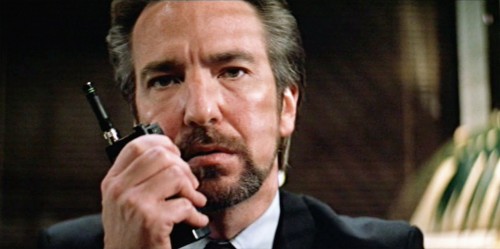
Interestingly for an American film, the two characters most obviously belonging to the elite are neither of them, at least originally, American. Gruber and Takagi are the power brokers in this world, able to amass the resources both for ostentatious displays of wealth, designer suits, limousines, fountains in skyscrapers, and to exercise their power, by drawing together a diverse and experienced terrorist/criminal group, or building a skyscraper in the center of L.A. Both represent all-powerful foreign interests converging on America and thus express attendant American anxieties. Both recognize the value of America as a place to conduct their business, being literally where money and power preside, and compete for those resources. Die Hard is a thoroughly diverse film, and that diversity is a key part of its subtext, an exploration of old-school American values adrift in a modern world, suddenly under threat and called upon to respond, in this case, violently. John McClane, of course, is the archetypal Irish cop, a defender of ostensible blue collar values, largely portrayed as a basic moral objectivism, thus embodying American conservatism’s image of itself, an image the film largely supports. On the other side, the modern world is represented across a spectrum, including Takagi, Gruber, Ellis (Hart Bochner), the high-energy, cocaine-addicted business negotiator, and Holly Gennaro McClane (Bonnie Bedelia), whose marriage to John is so tenuous at the start of the film that she’s going by her maiden name, providing an opportunity upon which Ellis attempts to capitalize.As McClane explains, Holly found “a good job that turned into a great career” and the tension between them is rooted in Holly’s sudden identity relocation, from a New York American ethnic, like McClane, to a high-powered modern woman, complete with the ability to swap out her surname as she chooses, rejecting the patriarchal assumptions it carries and hitting McClane directly in the gut, both in terms of their marriage and his conservative values. She attempts to downplay this to John by claiming that married women make Japanese business people nervous, a claim that inadvertently displays her ethnic background and is belied by the family photo featured prominently in her office, later serving as a key plot device. Takagi further pre-empts her in that slight, joking earlier in the film that he had been “sticking (McClane) with spears” when her husband first arrived at the party. Additionally, as Gruber later relates Takagi’s personal history to the party-goers, it’s clearly not a traditional Japanese story, beginning as a child immigrant, the graduate of numerous American universities, and the father of five, probably with an American wife.Holly, as John, is struggling with her place in this modern world but also has found herself thrust into a predatory environment where people like Ellis thrive. Even so, she’s proud of her accomplishments and eminently capable, elected as the representative of the hostages following Takagi’s death and willing to face down Gruber in that capacity. She’s the element, along with Takagi, that complicates McClane’s conservatism and keeps the audience from totally identifying with his viewpoint. A world with Holly in a position of power or success is a better world for it, as with Takagi. It’s ironic that it takes an extended, taxing, and bloody fight against an attendant modern phenomenon, leading right up to his possible death, before John can admit it, taking full blame for the state of their marriage. However, fearing he won’t survive, as he asks Al (Reginald VelJohnson) to tell Holly he’s sorry, he admits it’s the first apology he has ever offered. This exception makes the admission of guilt identifiable with the bulwarks of patriarchy, a power maintained by an assumed moral superiority which McClane finally rejects, tacitly and reluctantly, in the form of his first apology.Both Holly and Takagi’s positions as figures worthy of admiration are complicated by the corporate world they inhabit, whose complicity with the murderous world of Gruber is represented by Ellis. Throughout the film, Ellis is always grasping, in every scene attempting to establish himself as a figure of power and value. He spends his first scene in the film attempting to invite Holly to his apartment for Christmas Eve, despite her children at home, not to mention her marriage. That this is motivated less by sexual attraction and more by loneliness and an attempt at ownership is made clear when Takagi and McClane come upon him in Holly’s office doing lines on her desk. Ellis widens his disdain to include John, obviously wiping away the cocaine with one sweep over the desk and then shaking McClane’s hand, even as Takagi reminds him of John’s profession. As Holly then joins the group in her office, tentatively happy to see John, Ellis attempts to lob a broadside, cajoling Holly into showing McClane her new Rolex, while looking at John with derision to drive home this symbol of wealth and success, beyond McClane’s ken or his means to provide.Ellis’ identification with Gruber, seen in his love of wealth and expense, his use of illegal drugs (provided by terrorists or those affiliated with them), and his derision towards McClane and his profession, only intensifies throughout the film in a misnamed portrayal of Stockholm Syndrome (Helsinki Syndrome in the film). Convinced McClane’s actions against the terrorists are going to get them killed, and knowing who McClane is, Ellis attempts to enter negotiations with Gruber through an offer to get McClane to stop antagonizing him. Claiming to be college buddies, Ellis pretends to be held at gunpoint as he communicates with John over the radio, pleading with McClane to stop and thereby save his life. Of course, Ellis has badly miscalculated both how highly John values his life and how easily Gruber will take it. McClane refuses to quit, trying to disabuse Gruber of the notion of their friendship to save Ellis’s life, whereupon Gruber simply kills the negotiator. Ellis’s dead body is dragged away as the local news discusses “Helsinki” Syndrome with an expert, making the implication clear. Further, Gruber, realizing the utility of putting blood on McClane’s hands for outside observers in the form of the police and, most notably, the FBI, calls out the murder over the radio and publicly blames McClane for it, attempting to challenge his morality and destroy his outside utility.
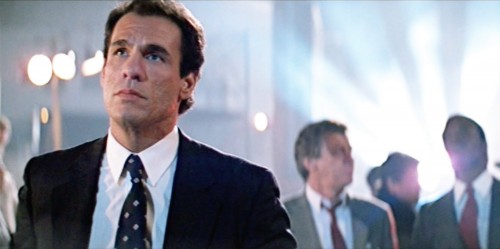
Within the portrayal of these law enforcement authorities lies one of Die Hard’s most sweeping criticisms. The film is very blue collar, implicitly trusting McClane, though he’s a little rough around the edges, as a down-home, simple type in pursuit of justice, and Al, as a beat cop starting a family, with a basic sense of goodness. This is in comparison to the Deputy Commissioner, Dwayne Robinson (Paul Gleason), who is stunningly incompetent, and the FBI agents, the Johnsons (Robert Davi and Grand L. Bush), who engage in calculations almost as heinous as Gruber’s. They play directly into his hands by cutting off the power, following the playbook as he knew they would, as opposed to McClane, who adapts his plans and actions to the situation on the ground, and thus shows flexibility and effectiveness in combatting Gruber. Beyond their predictability, the agents calculate the value of human life, dismissing a “breakage” of 25% with, “I can live with that.” As Dwayne, their actions, bluster and callousness portray a craven political agenda as foremost in their minds, as opposed to the survival of the hostages. It’s telling that, in the same scene as the breakage discussion, the older agent recalls his adventures in Saigon, invoking one of the worst political fiascos in American history, and conjuring up memories of institutional malfeasance, callousness, and cruelty in the minds of most viewers.Of course, McClane has to make such calculations as well, particularly when Hans kills Ellis. However, the film works to absolve McClane of culpability by having Ellis both introduce and then escalate the situation that leads to his death. Further, both Al and John agree there was nothing McClane could do, and those who feel otherwise, such as Dwayne, have been so thoroughly humiliated the audience can’t take them seriously, nor should they. In this sense, Die Hard gets to have its cake and eat it, too. It evokes common criticisms of institutional state responses to terrorism, then offers an alternative in the form of John McClane, but escapes criticism by couching him in a series of extremely lucky escapes and, when he’s presented with an impossibly difficult situation in reality, rendering it thoroughly out of his control – and who cares about Ellis anyway? It might be childish to say the film is unfair, but it’s true nonetheless. Though Die Hard continually pushes McClane into extremity – physically, emotionally, and morally – it still works to save him from actual audience censure. It must invoke a moral conundrum, so commonly understood as part of the narrative of terrorism it’s practically a trope, but it allows the audience to see things, such as Ellis’s culpability, that John does not, engaging us in the tension of the scene but keeping us from similarly engaging in the actual morally dubious decision-making that states must engage in when facing the real-life specter of international terrorism. Thus, while feeding popular American fantasies regarding good guys with guns, the film protects its characters, and audience, from the true, common consequences of such actions – friendly fire, panicked slaughter, wholesale executions and, of course, death. Usually, the fly in the ointment gets crushed and ruins the whole thing.
It further extends these criticisms, and lack of fair-play, into the media, castigating them as escalating terrorism worldwide and lacking entirely the intelligence or experience to address it properly, even in its most basic terms – as news anchor Harvey (David Ursin) says, “As in Helsinki, Sweden.” It’s interesting that he is corrected by the expert they have on interview, who is generally treated seriously, a marked contrast to most conservative-leaning fiction, which often goes out of its way to discredit experts and academics, especially in action films where the man of action either ignores or actively kills the man of thought, expertise, or bureaucracy, all three treated as one and the same. Die Hard seems much more basic in its general distrust of authority itself, especially bureaucracy, though McClane, as a salt of the earth New York police officer, is legitimized by his “authentic” authority and saves the day.In portraying the newsman who is capable, and foresees the explosive story before the siege begins in earnest, Thornbury (Richard Atherton), the film accentuates an overweening ambition and callousness towards his subjects. This becomes clear as he bullies his way into interviewing the McClane children[2], with a telling reference to state authorities in his threat to call the INS on their nanny, the televising of which interview puts Holly directly in danger, not to mention the moral dubiousness of inflicting such psychological pain on defenseless children for a bump in the ratings. The implication is clear – the endless, careless pursuit of “viewership” not only creates a sensationalized picture of facts on the ground, but actively endangers the participants and furthers the terrorist’s ends. Not only is their ability to convey information seriously undermined, but the motives and the methods of the media are brought under scrutiny, and, at least in the film, shown to do harm.However, there’s a certain disingenuousness to a film like Die Hard, a massive collusion of money, media, and authority, throwing dirt on all involved. This, of course, is an old trick – no one makes more money engaged in myopic self-criticism than Hollywood. But Die Hard particularly shows a calculated cynicism in its depiction of the horror of international terror. It deftly evades political commentary by making Gruber a former-terrorist-now-thief, while keeping the ticket-selling images of terrorism, hostages, and the one man hero. It dishes out criticisms that are only valid in the rarified space of the film itself – usually, cutting power is a time-honored and effective tactic in hostage situations, laying siege and starving the captors out. In Die Hard, however, under the preternatural skill and intelligence of Gruber, this is all a part of the plan, as is the eventual wholesale slaughter of the hostages. Surrounded by talk of Christmas miracles and accompanied by “Joy to the World,” this is all part of the crowd-pleaser fun, but it belies the issues it actually tangles with. The reality of terrorism lies in the political conundrums Die Hard so studiously avoids, and there’s something deeply troubling and thoroughly American about separating the explosive mayhem seen on our television screens from the political situation, and the human cost in which the violence finds its roots.
It’s obviously tempting to buy into Die Hard’s rhetoric surrounding a good guy with guns (and explosives), but the idea of the presence of John McClane at recent actual events evoked by the film, such as the San Bernardino shooting, fails to comfort and ultimately cheapens the horror itself. We want to dwell in the moral comfort the film offers, but reality is much more twisted and difficult, and the lived-in experience of terrorism is characterized by the fetid air of competing ideologies born out of desperation and alienation. To shoot, bomb, sabotage, and kill is the ultimate expression of a political ideology and the desperation it comes from. There are no suicide bombs hidden under tailored suits.
These themes are very skillfully centralized in the climax. As McClane confronts Gruber, they engage in a meta-conversation that’s been running throughout the piece concerning popular American portrayals of heroism. Gruber derides the provincial values of popular Westerns of the 40s and 50s continually, hoping to demoralize McClane, and evokes them again as he holds Holly captive, “This time John Wayne does not walk off into the sunset with Grace Kelly.” Of course, he gets it wrong, as McClane corrects him, not to mention fails to catch a life-saving relevance to McClane’s self-identification as Roy Rodgers, a more comedic, sly, sideways hero than Gary Cooper or especially John Wayne, willing to win by tricks and determined to stack his deck as much as possible in any conflict in which he enters. McClane is not going to announce his presence as he calmly approaches his opponent down a dust-blown street. He’s got a trick up his sleeve, in this case a handgun strapped to his back, which gives him just the edge he needs to shoot Gruber first. Die Hard agrees with Gruber – John Wayne doesn’t survive in the modern world here portrayed. To some extent, as we saw when McClane dropped several bricks of C-4 down an elevator shaft and gave up Ellis for dead, in this film you have to use terrorist tactics to beat terrorists. Of course, it can go too far, as with the FBI, but ultimately Die Hard places McClane’s heroism relativistically, cheating a little by morally stacking his deck – in the above examples, a C-4 bombing to wipe out bazooka wielding terrorists, giving the police a chance to retreat and regroup, and, quite frankly, leaving Ellis to his own devices.So, McClane’s cleverness and subterfuge saves the day, except Gruber tumbles out of the window next to him, nearly taking Holly with him. As he struggles to hold on and Holly struggles to release herself, McClane, rushing to her aid, notices a telling and brilliantly plotted detail. Gruber’s fingers are wrapped tightly around Holly’s Rolex, the gift Ellis boasted of and by which he attempted to humiliate John. He releases the clasp and Gruber takes the watch with him, falling from the top of the tower to his death. The watch renders the struggle between the three into a complex and troubling microcosm, Americans bound by wealth and privilege to European terrorism, who must, in order to save themselves, reject the moneyed success of the modern, globalized world. This image is strikingly provincial, a retrenchment to American peoples and “values” as Europe goes tumbling down to a horrific death.This is emphasized later as Al, pulling his pistol to save McClane, shoots down the hidden terrorist Karl (Alexander Godunov), rising from a refugee blanket like a terrifying specter. This image, the wolf hiding amongst sheep, a terrorist traveling or escaping via refugee status, carries further echoes of last year in the Paris attacks and this year in Brussels, again reinforcing the film’s strange predictive quality. More to the point, the conflicts the image evokes, with their political and moral conundrums, are shown to be constant and universal. Of course, Al shoots him dead, putting a period on the film’s thematic through line, which can effectively be summed up as: terrorism will only be defeated when everyday people, preferably American cops, rise up and kill some terrorists. This is especially bolstered by Al’s trauma over accidentally shooting a child some years prior to the film. By now raising his gun, Al’s action takes on such moral, obligatory force as to overcome, perhaps even eliminate, the trauma over killing an innocent child. Regardless of the morality of the act itself, which is difficult to dispute, this thematic and narrative structure places it as the climax of the film, reinterpreting itself not as the fight of one man against a terrorist-thief band but actually as a fight between Americans and their own complacency. This is the film’s final, most cutting criticism, and, though it still buys into notions of American exceptionalism and good guys with guns, it also tacitly acknowledges the role of the USA as generative in the creation of the modern age of terror.However, buried under layers of subtlety, it still misses the point – as a nation, America doesn’t bear responsibility in the creation and survival of scores of terrorist groups through complacency but bears that responsibility through active funding and encouragement. The IRA thrived through the generous and consistent donations of millions of uninformed, “Kiss me, I’m Irish” Americans. Terrorist groups throughout Europe, the root of Hans Gruber, were funded and moved like chess pieces in the great match of the Cold War. Numerous militias, guerrillas, and drug traffickers have been funded, trained, utilized and co-opted by the CIA, particularly in Southeast Asia and the Americas, where the Iran-Contra scandal is only one of numerous operations enacted in widespread violation of national self-determinism and wider human rights, often accompanied by the slaughter of civilians, and all approved by Presidents, Senators, bureaucrats, etc., and thus tacitly by the American people.In Die Hard, this cat is out of the bag but still catchable, in direct contravention of plain fact, even then, and feeding into the fantasy of American exceptional heroism. Though supported by an incredibly sophisticated narrative and thematic structure, often quite trenchant, deft, and subtle, Die Hard eventually settles into its conservative American values, with their attendant myopia. Though it suggests a new American hero beyond western cowboys, they still solve their problems violently, their wives still eventually accept their husband’s surnames, and the mindset that created this modern age is reaffirmed, reinforced, and acclaimed. Though divested of the global wealth that binds them to people like Gruber, conveniently separated from our hero in the form of his wife, John and Holly still effectively ride off as the heroes of old, lit romantically in the back of the limousine, now isolated, content that they’ll be safe. Of course, not two decades later, the image invoked in a floor-clearing C-4 elevator drop comes back, now accompanied by the voices and commentaries of newscasters and political pundits, preceded by the horror of a crashing plane, and we again stare our complacency and, ultimately, our complicity in the face.Dedicated to Alan Rickman, whose genius was an indispensable part of this film and many others.[1] The Volksfrei are most likely loosely analogous to the Red Army Faction, an influential and dangerous group operating primarily in Western Germany, but just one of many, many violent groups operating in Eastern and Central Europe at that time.[2] As with many things in this film, this too is echoed in recent events, the journalistic invasion of the privacy of the San Bernardino shooters’ empty apartment.

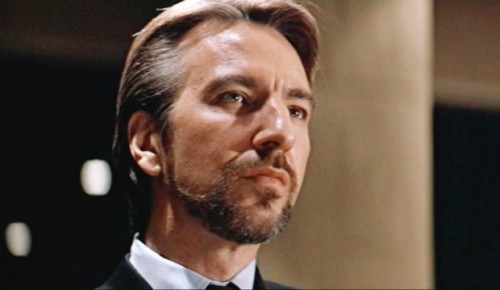
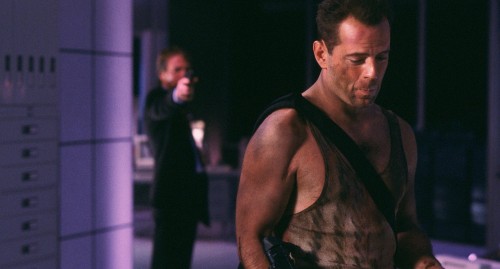
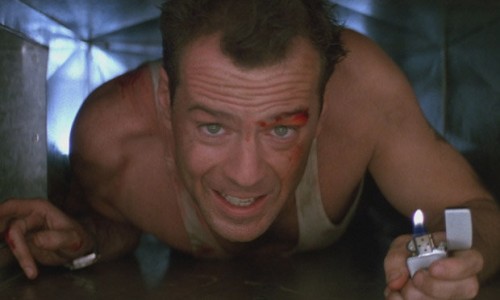
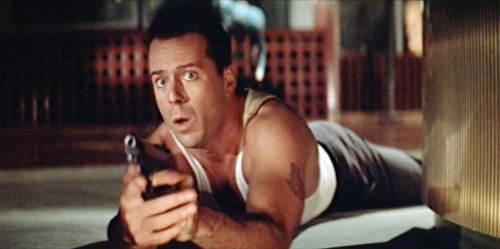
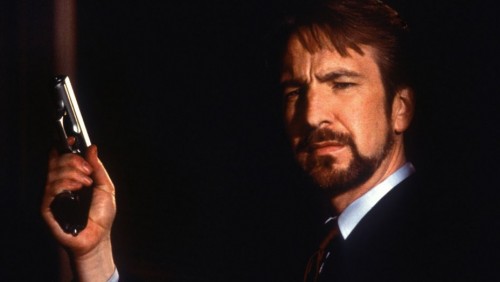
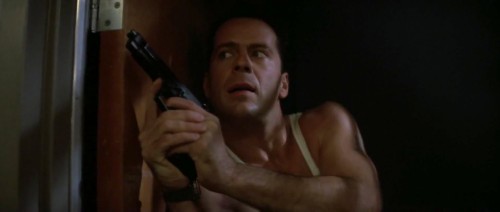





























In the book it’s based on, Nothing Lasts Forever, they really are ideologically motivated German terrorists trying to expose the corporation’s ties to the Chilean regime:
https://en.wikipedia.org/wiki/Nothing_Lasts_Forever_%28Thorp_novel%29
That’s fascinating. It’s especially interesting in that it predates the Iran-Contra scandal but seems to be, as throughout the film whose main set-pieces are taken directly from the novel, almost predictive of it.
Having read the wiki page you linked, too, though, I’m glad they made the changes they did, as the themes I discuss in this piece, and why I enjoy the film as much as I do, are largely due to the much more cosmopolitan nature of the world portrayed and the difficult inter-classification of the thieves’ villainy. They expand the discussion of money and success as compromising forces found in the novel and tie them in to larger, globalized concerns, linking them to outside commercial forces.
Interestingly, the novel seems to pre-empt my primary criticism of the film, as ignoring the difficult, protracted, often decisive role of American society in terrorism politics, by tying in the Klaxon Oil Company, an American corporation, to Chilean terrorists, thus implicating them in the larger dynamic. The wiki also suggests that the lead character could be the source of the violence himself, and the terrorists are not at all motivated by money. In some ways, that makes it seem more satisfying as a discussion of global terrorism, but less, as, by summary, it seems much more conceptual in its approach of the terrorists and not so rooted in the practical and social realities of these organizations.